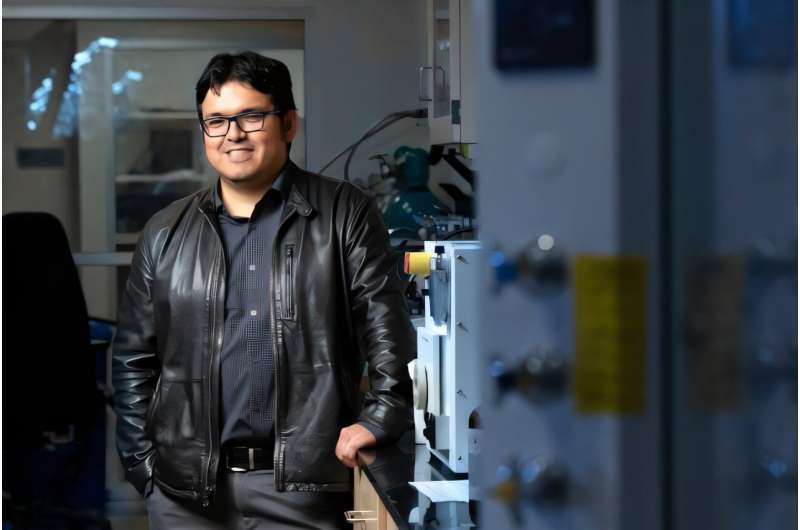Researchers at the University of California, Irvine have discovered a new state of quantum matter. The state exists within a material that the team reports could lead to a new era of self-charging computers and ones capable of withstanding the challenges of deep space travel.
“It’s a new phase of matter, similar to how water can exist as liquid, ice or vapor,” said Luis A. Jauregui, professor of physics & astronomy at UC Irvine and corresponding author of the new paper in Physical Review Letters.
“It’s only been theoretically predicted—no one has ever measured it until now.”
This new phase is like a liquid composed of electrons and their counterparts, known as “holes,” spontaneously pairing and forming exotic states known as excitons. Unusually, the electrons and holes spin together in the same direction.
“It’s its own new thing,” Jauregui said. “If we could hold it in our hands, it would glow a bright, high-frequency light.”
The phase exists in a material developed at UC Irvine by Jinyu Liu, a postdoctoral researcher in Jauregui’s lab and the first author of the paper. Jauregui and his team measured the phase using high magnetic fields at the Los Alamos National Laboratory (LANL) in New Mexico.
The key to creating the new quantum matter was in applying a high-intensity magnetic field of up to 70 Teslas to the material (by comparison, the magnetic field from a strong fridge magnet is around 0.1 Teslas), which the team calls hafnium pentatelluride.

Jauregui explained that, as his team applied the magnetic field, the “material’s ability to carry electricity suddenly drops, showing that it has transformed into this exotic state,” he said. “This discovery is important because it may allow signals to be carried by spin rather than electrical charge, offering a new path toward energy-efficient technologies like spin-based electronics or quantum devices.”
Unlike conventional materials used in electronics, this new quantum matter isn’t affected by any form of radiation, which makes it an ideal candidate for space travel.
“It could be useful for space missions,” Jauregui said. “If you want computers in space that are going to last, this is one way to make that happen.”
Companies like SpaceX are planning human-piloted space flights to Mars, and to do that effectively, you need computers that can withstand prolonged periods of exposure to radiation.
“We don’t know yet what possibilities will open as a result,” Jauregui said.
The material was synthesized, characterized and made into measurable devices at UC Irvine by Jinyu Liu with assistance from graduate students Robert Welser and Timothy McSorley, and undergraduate researcher Triet Ho.
Theoretical modeling and interpretation were provided by Shizeng Lin, Varsha Subramanyan, and Avadh Saxena at LANL.
High-magnetic-field experiments were conducted with the support of Laurel Winter and Michael T. Pettes at LANL and David Graf at the National High Magnetic Field Laboratory in Florida.
More information:
Jinyu Liu et al, Possible Spin-Triplet Excitonic Insulator in the Ultraquantum Limit of HfTe5, Physical Review Letters (2025). DOI: 10.1103/bj2n-4k2w
Citation:
Physicists discover new state of quantum matter (2025, July 25)
retrieved 26 July 2025
from
This document is subject to copyright. Apart from any fair dealing for the purpose of private study or research, no
part may be reproduced without the written permission. The content is provided for information purposes only.

